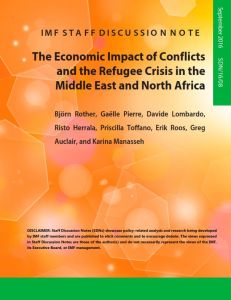Únase a getAbstract para acceder al resumen.

Únase a getAbstract para acceder al resumen.
Björn Rother, Gaëlle Pierre, Davide Lombardo, Risto Herrala, Priscilla Toffano, Erik Roos, Greg Auclair and Karina Manasseh
The Economic Impact of Conflicts and the Refugee Crisis in the Middle East and North Africa
IMF, 2016
¿De qué se trata?
The economic consequences of the violence that has displaced millions of people are widespread and severe.
Recommendation
The economic and financial consequences of the violence that has torn apart the social fabric of some countries in the Middle East and North Africa (MENA) are widespread and severe. Countries in the midst of active conflict have seen their GDPs fall, foreign investments decline and basic services suffer. In addition, the greatest refugee crisis since World War II accompanies other economic spillovers in neighboring nations and in Europe. As this sobering report from the International Monetary Fund portrays, these problems are likely to haunt MENA for many years. getAbstract recommends this somber analysis to anyone interested in the economic impacts of political instability and violence.
Summary
About the Authors
Björn Rother et al. are economists at the International Monetary Fund.



















Comment on this summary